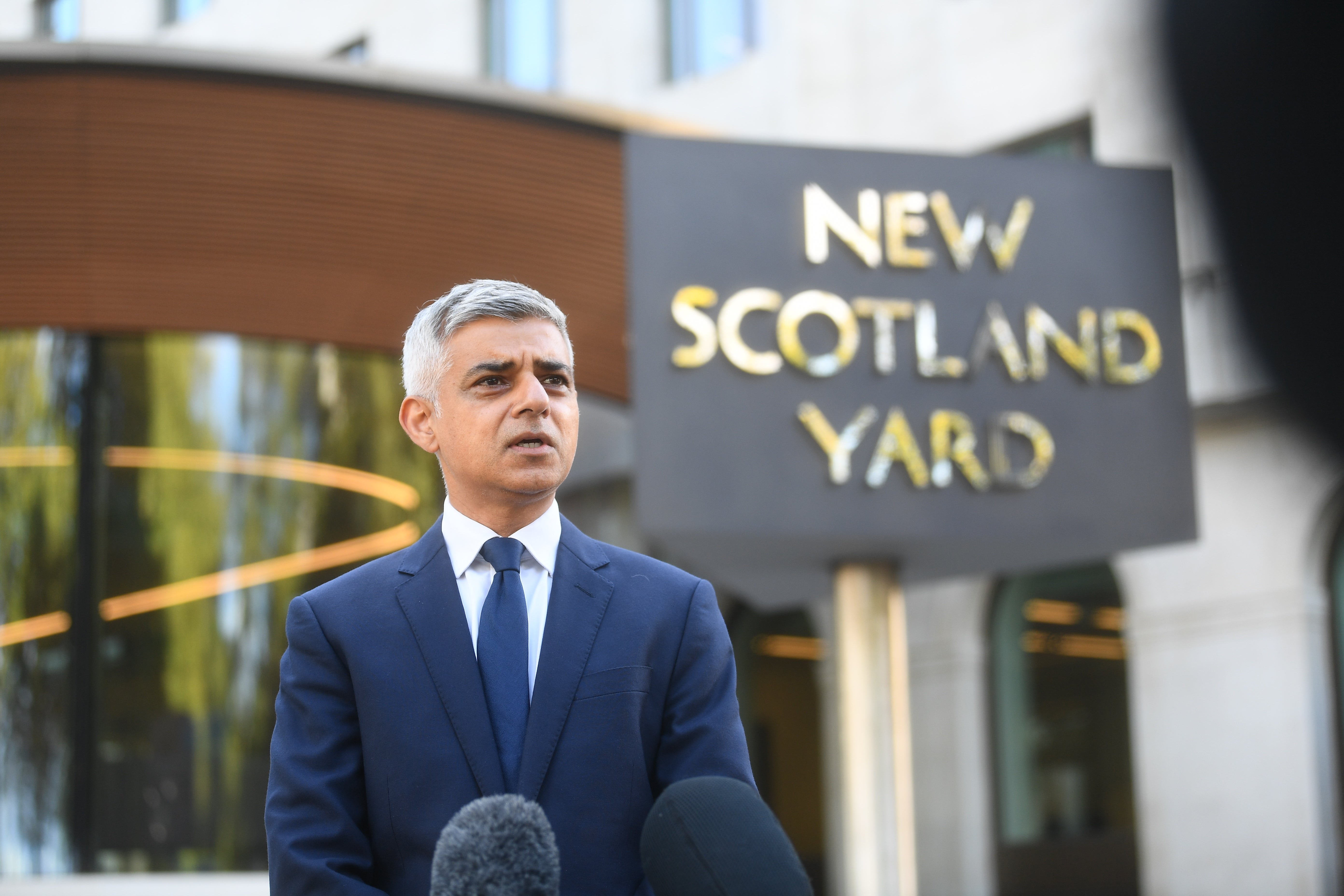Met Police Federation accused of being ‘in denial’ over work needed to tackle misogyny and racism
Outrage after body accuses Sadiq Khan of undermining public trust over a ‘very small number of incidents’

Campaigners have accused a police leader of “being in denial” about the need to tackle misogyny and racism, amid a backlash to the ousting of Dame Cressida Dick.
The Metropolitan Police Federation, which represents rank-and-file officers, declared it has “no faith” in London mayor Sadiq Khan and accused him of undermining their work on Monday.
Without mentioning the murder of Sarah Everard directly, chair Ken Marsh said “the very small number of incidents that have hit the headlines over recent months” did not reflect the force.
“The hard work of our colleagues – and public trust in our colleagues – is being undermined by politicians and by the mayor of London in particular,” he added, hitting out at “scaremongering”.
“These officers are being unfairly lambasted for things they haven’t done. My colleagues are working day and night to keep London safe. To be all branded in this shaming and negative way – as they are being by some politicians and many sections of the media – is wholly unfair.”
Mr Marsh said horrific incidents should be “put in context”, adding: “We do not want these individuals in the job but the federation will continue to speak up for our good officers.”
He said many were “saddened and angry” that Dame Cressida had been pushed out and insisted that the force’s culture had been changing.
The End Violence Against Women Coalition warned that the only way for Scotland Yard to rebuild trust was through accountability and a willingness to listen to survivors.
Deputy director Deniz Uğur added: “This amounts to yet more denial of the difficult internal work the institution needs to do to address its abundantly clear problem with racism and misogyny.
“The evidence is clear: these issues are systemic within the Met and police forces across the country, as evidenced by multiple police inspectorate and complaints body findings.”
One of the organisers of a vigil for Ms Everard, who was threatened with a £10,000 Covid fine after police refused to facilitate the event, urged Mr Marsh and his colleagues not to “close ranks” and instead to publicly call out bad behaviour and attitudes.
Anna Birley, co-founder of the Reclaim These Streets group, told The Independent: “Disaffection and distrust isn’t caused by campaigners and politicians calling out misogyny and racism.

“It is caused by those officers sharing selfies with murdered sisters, those officers who nicknamed Wayne Couzens the rapist but didn’t see the need to challenge his behaviour, those officers who strip-searched Dr Konstancja Duff and their colleagues who covered it up, those officers sharing deeply offensive and discriminatory WhatsApp messages and sending rape threats to their female colleagues in Charing Cross.
“The mayor is right to expect better – women in London certainly deserve better.”
Mr Marsh’s statement was released during a misconduct hearing for a Metropolitan Police commander accused of taking cannabis, LSD and magic mushrooms. Commander Julian Bennett chaired misconduct hearings and wrote the force’s current drug strategy.
Another Metropolitan Police officer, PC David Carrick, is to go on trial accused of rape and sex offences against eight women later this year, while two enquiries triggered by Ms Everard’s murder are underway.
Dame Cressida’s resignation was sparked by a damning watchdog report on misogynist and racist behaviour at Charing Cross police station. Mr Khan demanded a plan of action and told the commissioner he had no confidence in her leadership after reading her response.
She had rebuffed calls to resign in June, after a probe into the unsolved 1987 murder of private detective Daniel Morgan saw the Metropolitan Police accused of institutional corruption.
His brother, Alastair Morgan, told The Independent: “I'd say the Met have done a very good job themselves in undermining public confidence. Trying to blame someone else and supporting Cressida Dick is not the way back for the Met. The public wants root and branch reform of the police.”
The force has also recently been criticised for being slow to investigate the reports of parties in Downing Street and Whitehall in breach of Covid restrictions.
Members of the Metropolitan Police Federation were not balloted over the declaration of no confidence in Mr Khan, and the decision was taken by its elected executive.
Some officers questioned the announcement and what it would achieve, with one writing on Twitter: “While losing Cressida Dick was a mistake in my opinion, it wasn’t unsurprising, and while it’s good to see the Fed offer their support, I’m not sure this was the way to do it.”
A spokesperson for the mayor of London said a change of leadership was the “only way to address a crisis in trust” following a series of scandals exposing evidence of racism, misogyny, homophobia, harassment and discrimination.
“The mayor has always made clear that there are thousands of incredibly brave and decent police officers at the Met, who we owe a huge debt of gratitude,” she added.
“But the series of scandals seen in recent years has tarnished the reputation of the police, which is so crucial to policing by consent. Downplaying the scale of the change required is only going to hinder, not help, the vital process of restoring Londoners’ trust in the Met.”
Dame Cressida is remaining in post while the next commissioner is selected by the Home Office. The process is expected to take several months.
Join our commenting forum
Join thought-provoking conversations, follow other Independent readers and see their replies
Comments



Bookmark popover
Removed from bookmarks